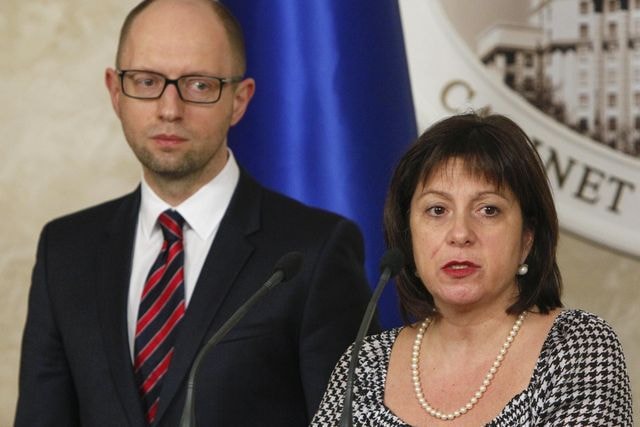Ukraine: When the home front economy is exhausted
(Baonghean) - On Friday, March 13, negotiations to restructure Ukraine's public debt sector began with the aim of reducing debt of up to 15 billion USD, accounting for about 1/3 of the country's financial needs from now until 2019.
 |
| Prime Minister Arseny Yatseniuk (left) and Ukrainian Finance Minister Natalia Yaresko (right). |
This event took place within less than 48 hours since the International Monetary Fund (IMF) decided to approve a $17.5 billion support program. The program will last for four years and is expected by Ukraine to help the country escape from a severe recession. Two years of recession with an industrial base destroyed by a prolonged civil war has left more than 6,000 people dead in the East of the country. The Ukrainian currency has depreciated and lost 70% of its value compared to the US dollar since a year ago; inflation is approximately 35%; public debt is large and has doubled in just one year; foreign currency reserves are even lower than a month's import turnover;... The Ukrainian economy is on the brink of collapse and the people of this country are struggling with a mountain of difficulties and deprivation.
In that situation, the Ukrainian government advocated relying on international aid to revive the domestic economy, but any aid has its price. The Ukrainian government had to apply measures that directly worsened the poverty of its people, at least in the first period. The IMF issued a "warning": the first aid of up to 5 billion dollars will be poured into Ukraine no later than Friday, March 13, but only on the condition that the country adopts more drastic reform measures to "clean up" public accounts, reduce corruption or restructure the banking sector. Since the overthrow of former President Viktor Yanukovych more than a year ago, the vote or implementation of these reform policies has been delayed until now.
To demonstrate its determination to change and cooperate, in early March, the Ukrainian government announced a threefold increase in the price of household gas and a 70% increase in heating prices. At the same time, the state energy corporation Naftogaz is also expected to be privatized - these drastic measures show that the energy sector will be "at the forefront" of reform policies. In addition, pensions are also being reduced: specifically, those who are still of working age and would receive a pension of more than 1,423 hryvnia/month (ie 53 euros/month) under the old regulations, will now receive only 85% of this pension.
These measures, which may please foreign “philanthropists,” have come at a significant social cost at home. Last week, President Petro Poroshenko called on the nation to “look the truth in the face.” “As long as the civil war continues, there will be no investment in Ukraine,” he warned. State Bank Governor Valeria Gontavera asserted: “Our country has not experienced such a difficult time since World War II.” Economy Minister Aivaras Abromavicius expressed concern about the negative consequences of such drastic measures: “At the current exchange rate, salaries are falling below $200 a month. This opens the door to corruption. We must quickly vote on an administrative reform that will allow for a sharp reduction in staff and a pay increase for the rest of the system.”
When talking about Ukraine today, people often think of the security and political crisis in the East of this country and the troubled relationship with Russia and Europe. However, a source in Kiev - a high-ranking security official - admitted a few weeks ago that the instability caused by the economic crisis is much more worrying for Ukraine. As an example of the danger of increasing poverty among the people, this person used himself as an example: along with the policy of reducing salaries and the decline of the Ukrainian currency, his income has decreased from 2,500 to 2,000 US dollars within a year. Meanwhile, in Kiev, the price of gasoline has increased 2.5 times in 14 months, inflation shows no signs of slowing down and reached 34.5% in February.
The hryvnia has continued to lose 40% of its value in recent weeks. This has accelerated since February 5, when the Central Bank of Ukraine asked the IMF to stop intervening to protect the currency. During the week of March 3 to March 9, the official exchange rate reached 30 hryvnia to the US dollar. This rate was 16.32 at the beginning of 2015 and 8 at the beginning of 2014, completely depleting the purchasing power of the Ukrainian people.
Contrary to the reaction of the Ukrainian people, it is clear that the above efforts of the government of this country are positively recognized by international donors. IMF General Director Christine Lagarde affirmed: "The Kiev government is still demonstrating its determination to pursue radical reforms in an extremely difficult context." Perhaps that is also the only choice for Ukraine at the moment and Kiev will not give up when the Central Bank announced on Thursday, March 12, that it is ready to strengthen capital controls if the exchange market continues to decline. It seems that declaring war on Russia is never easy, no matter on which front. If the Russian economy has temporarily overcome the bottom of the crisis and is holding out quite persistently, the situation of Ukraine is much more dangerous. Another burden for Europe, when this region is also having a headache with the huge debts of Greece. Another proof proving the law of "cause and effect" between security - politics and economy.
Thuc Anh
(According to Le monde)
| RELATED NEWS |
|---|






